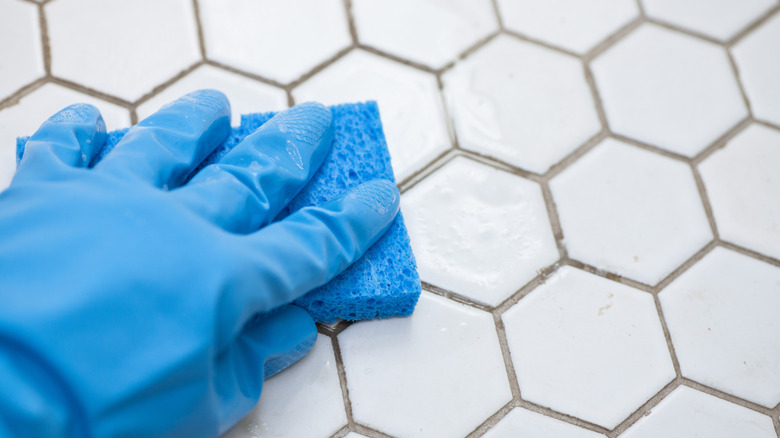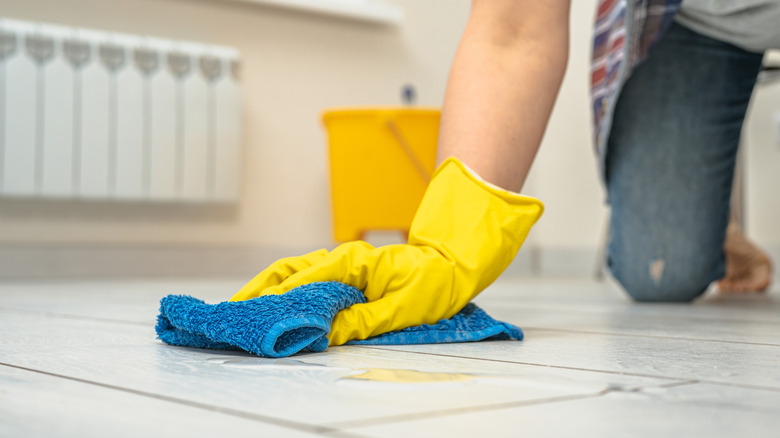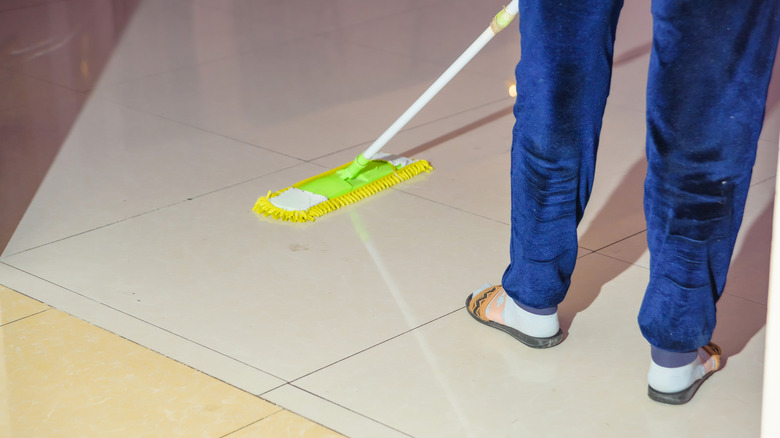Don't Make These Mistakes When Cleaning Porcelain Tiles
We may receive a commission on purchases made from links.
Porcelain tiles are a beautiful, durable, and versatile choice for homes, suiting a wide range of different design aesthetics from modern to elegant. But, like any surface, they require proper care in order to maintain their appeal. Unfortunately, as durable as porcelain is, cleaning your tiles the wrong way can end up dulling their shine or even causing long-term damage. Here are cleaning ingredients to avoid using on porcelain and how you can avoid the most common missteps to keep your tiles looking their best.
Not all porcelain tiles are the same, and using the wrong cleaner can wreak havoc on their appearance and durability. Whether your tiles are glazed, polished, unpolished, or textured, each type requires specific care. Glazed and polished tiles have a glossy finish, which can quickly become dulled by abrasive or harsh cleaners. Unpolished tiles, on the other hand, may not get dull, but will likely require you to clean them more frequently as they get dirty and stain quicker.
Textured porcelain tiles are popular for their anti-slip properties, but they often trap dirt more easily in their grooves. For these, you'll need to use a gentle, pH-balanced cleaner that won't strip the surface. Avoid all-purpose cleaners that claim to work on everything but don't account for the unique needs of porcelain. Harsh chemicals like bleach or ammonia can weaken grout lines and lead to dullness and damage. To keep your tiles in tip-top shape, always read the label on cleaning products and opt for those specifically designed for porcelain surfaces.
Gentle cleaning techniques are key
Porcelain tiles are tough, but they're not invincible. Scrubbing too hard or using the wrong tools can lead to scratches or a worn appearance over time. Stay far away from steel wool, scouring pads, or stiff-bristled brushes. Instead, the basics on cleaning porcelain tile involve using a microfiber cloth or soft mop, both of which are gentle on the surface while still effective at removing dirt.
Stains should be addressed immediately to prevent them from setting into the tiles. Although porcelain is generally quite stain-resistant, substances like coffee, wine or oil can still lead to discoloration if left unattended. Once a stain sets, it can be much more difficult to remove without risking damage to the tile's finish. A simple wipe with a damp cloth and a mild cleaner can often work wonders if done promptly.
While the simplest way to achieve dazzling porcelain floors is using plain old water, it's important to avoid over-wetting your tiles during cleaning. While porcelain is water-resistant, excessive moisture can seep into grout lines, weakening them over time and causing fading or discoloration. Use a damp mop rather than a soaking one, and always dry the surface afterward with a clean towel or cloth to prevent water spots and streaks.
Steer clear of wax- and oil-based cleaners
While wax- or oil-based cleaners might promise a shiny, polished look, they're more trouble than they're worth for porcelain tiles. These products often leave behind a sticky residue that not only attracts dirt but can also create a slippery surface — a potential safety hazard, especially for flooring. Residue buildup doesn't just make your tiles look dirty faster; it also can also cause damage. The result? Tiles that always look grimy, no matter how often you clean them. Instead, stick to residue-free cleaning products that enhance the look of the tile without impacting safety or cleanliness.
By keeping wax- and oil-based cleaners off your shopping list, you'll also save yourself the headache of stripping away layers of gunk later. If you've already made the mistake of using such products, consider using a specialized tile cleaner, such as the Goo Gone Grout & Tile Cleaner, designed to remove waxy buildup without damaging the surface.


